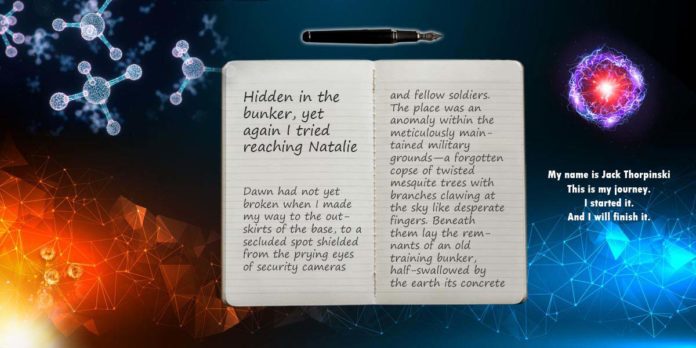Dawn had not yet broken when I made my way to the outskirts of the base, to a secluded spot shielded from the prying eyes of security cameras and fellow soldiers. The place was an anomaly within the meticulously maintained military grounds—a forgotten copse of twisted mesquite trees with branches clawing at the sky like desperate fingers. Beneath them lay the remnants of an old training bunker, half-swallowed by the earth its concrete walls were a testament to long-abandoned protocols.
The acoustics inside of it were unsettling. The faintest of sounds—an exhale, the rustle of fabric against concrete—were magnified, bouncing back at me as if the very air was alive with echoes of the past. It was as though the bunker itself was trying to speak, to warn me of the gravity of my situation, urging me to remain hidden, to stay silent.
As the sky outside began to shift from indigo to the softest hints of pink and orange, I could almost feel the bunker holding its breath with me. It was a place that had seen preparations for wars, the strategy of survival, and now it harboured me—a soldier with no orders, no clear enemy, just the gnawing fear of what Rashmoor’s next move might be and the absence of Natalie, which felt like a gathering storm about to break.
This was where I chose to hide, in the belly of decay as I wrestled with the enormity of the previous day’s events. The shooting range incident replayed in my head. The sound of the agent’s skull cracking against the curb was now merging with the relentless ringing of Natalie’s unanswered phone.
Nothing but silence
I dialled her number again and the screen’s glow was a lonely beacon in the predawn gloom. Each ring hollowed out the hope I clung to. Natalie was the constant in my life, the beacon that would never flicker or fade. But now, that light was extinguished, and in its absence, I found myself navigating through the darkest night of my soul.
More than a week had passed without a word from her. This was unprecedented and alarming and the silence I was hearing in the phone was a void growing wider with each unanswered call.
A cold breeze whispered through the bunker, carrying with it the desert’s chill and the hint of impending action. Rashmoor would come for me soon and I was certain of that. His interrogation would be meticulous, a psychological strip search by a man skilled in the art of war both in and out of the battlefield. I had to be ready, but first, I needed to ensure Natalie was safe.
The isolation of my hidden refuge was a double-edged sword—it provided cover but its remoteness also provided a great opportunity for Rashmoor to deliver his blow, if only he could find me. But I looked around and there was no one there.
I could envision the day ahead: the base stirring to life, Rashmoor’s men seeking me out. The questions would come, each one loaded, ready to fire. But my mind was elsewhere, caught in the web of Natalie’s disappearance. The thought that she could be in danger, perhaps because of my actions, tightened around my chest like a vice.
The first hints of daylight began to seep over the horizon, casting a pale light that seemed to mock my despair.
I had zero luck trying to connect with Natalie again. I pocketed my phone, stood up and dusted off my trousers. Then I looked out over the expanse of the base knowing that I needed to face the day, to face Rashmoor, but most of all, I needed to find Natalie.
I stepped out of the bunker’s shadow, and the landscape of the base stretched out before me like a chessboard. In this game, I was a pawn, but I vowed not to be sacrificed so easily. Natalie’s safety, our future, depended on it.










